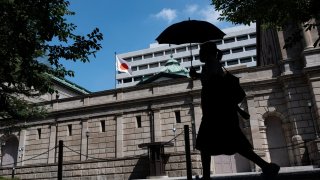
- The Bank of Japan kept its policy rate unchanged Friday after its monetary policy meeting, holding its benchmark policy rate at 0%-0.1%.
- While the move was expected, this comes after Tokyo's April inflation came in lower than expected.
- The currency broke through the 156 mark against the U.S. dollar Friday after the decision, most recently trading at 156.7.
The Bank of Japan kept its policy rate unchanged Friday after its monetary policy meeting, holding its benchmark policy rate at 0%-0.1%.
This is in line with expectations from economists polled by Reuters.
While the move was expected, this comes after Tokyo's April inflation came in lower than expected, with the core inflation rate at 1.6% compared to expectations of 2.2% from Reuters.
We're making it easier for you to find stories that matter with our new newsletter — The 4Front. Sign up here and get news that is important for you to your inbox.
The BOJ also said it will continue to conduct bond purchases in line with the March decision. The bank previously said in March it bought about six trillion yen ($83.5 billion) worth of bonds per month in the past.
No comment was made by the BOJ on the yen in the monetary policy statement, which has steadily weakened since the BOJ ended its negative interest rate policy last month and abolished its yield curve control policy.
The currency broke through the 156 mark against the U.S. dollar Friday after the decision, most recently trading at 156.7.
Money Report
During a press conference later Friday, BOJ Governor Kazuo Ueda said that while the bank's monetary policy does not directly target currency rates, exchange rate volatility could have a "significant impact" on Japan's economy and prices, according to a Reuters translation.
Ueda added that "if yen moves have an effect on the economy and prices that is hard to ignore, it could be a reason to adjust policy," according to remarks translated by Reuters.
He pointed out that the weak yen has not had a big impact on underlying inflation for now, but noted that "prices are overshooting as a whole," Reuters reported. Ueda also that there is a risk that Japan could see another round of cost-push inflation, according to the translation.
Cost-push inflation refers to when prices rise due to increases in production costs, in contrast to demand-pull inflation, which occurs due to demand outstripping supply.
"In gauging underlying inflation, we won't look at single data. We will look at various indicators and economic factors behind the price moves such as the output gap and inflation expectations," Ueda said, according to the translation.
Inflation to rise slightly
Separately, the central bank also released its second-quarter outlook for Japan's economy, raising its outlook for inflation in fiscal 2024.
The BOJ now expects inflation between 2.5% and 3% for fiscal 2024, up from 2.2% to 2.5% in its January forecast.
Inflation is then predicted to decelerate to "around 2%" in fiscal 2025 and 2026, the bank added.
The BOJ also downgraded gross domestic product growth forecasts for fiscal 2024 to a range of 0.7% to 1%, down from January's prediction of 1%-1.2% growth.
Accommodative policy to remain
In light of the outlook report, the BOJ said that moving forward, the conduct of its monetary policy will depend on future developments in economic and price conditions. But it said accommodative financial conditions will be maintained "for the time being."
The BOJ does acknowledge that uncertainties surrounding these economic and financial developments at home and abroad remain high. But if its forecasts are realized and underlying inflation increases, the central bank said it will "adjust the degree of monetary accommodation."






